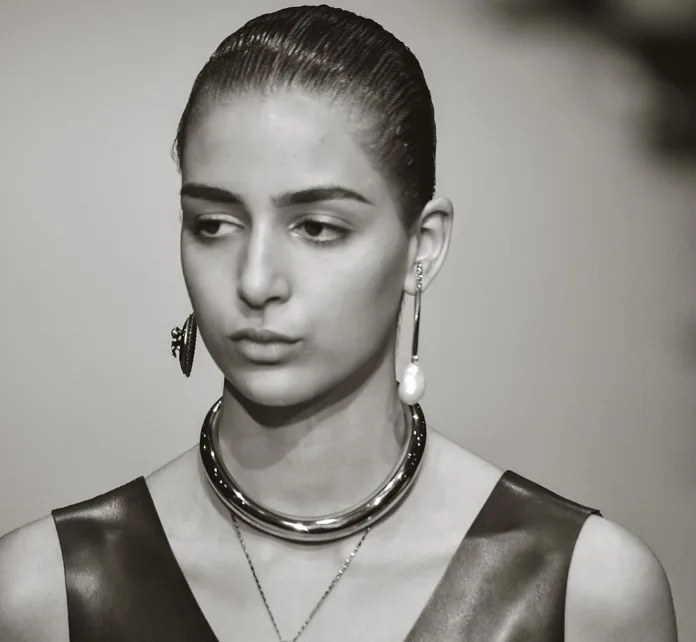British-Moroccan model Nora Attal joins the fashion elite at Paris Fashion Week’s BOF 500 event, showcasing the industry’s top influencers
Nora Attal, the celebrated British-Moroccan model, attended the prestigious Business of Fashion (BoF) 500 Class of 2024 celebration in Paris, held during the iconic Paris Fashion Week. Attal was seen posing alongside Imran Amed, CEO and Editor-in-Chief of the renowned fashion publication. The event, which took place at the opulent Shangri-La Hotel, brought together fashion industry leaders, designers, and models, all recognized for their significant contributions to global fashion.
Dressed in a striking black gown that featured a dramatic cut-away back revealing a chic white corset, Attal stole the spotlight as she mingled with fellow honorees. This appearance capped off a busy season for the model, who had already walked in high-profile shows such as Burberry, Simone Rocha, and Dolce & Gabbana at both London and Milan Fashion Weeks.
Embed from Getty ImagesThe BoF 500 Class of 2024 includes key figures such as Thomas Plantega, credited for revitalizing the resale platform Vinted, and Faraz Manan, a Pakistani designer whose bridal collections are sought after across South Asia and the Middle East. This year’s list reflects the global diversity of the fashion industry, with 37 nationalities represented across 26 countries.
Among the attendees were design duo Benjamin Alexander Huseby and Serhat Isik, who showcased their signature streetwear aesthetic with outfits inspired by the Palestinian keffiyeh. The pair is known for its focus on sustainability and has earned a loyal following within the fashion community.
BoF 500, launched in 2013, celebrates the most influential individuals in fashion, from designers and creative directors to executives and entrepreneurs. Imran Amed emphasized that the annual list aims to go beyond the superficial aspects of fashion by highlighting the key players who animate and transform the business. With its focus on innovation and diversity, the BoF 500 has become a benchmark for excellence in the fashion industry.
As Attal continues to rise in the modelling world, her presence at events like the BoF 500 highlights her growing influence. With multiple runway appearances this season and a growing reputation, she represents a new generation of models who are shaping the fashion industry through both their work and their cultural backgrounds.
Analysis:
Political:
The BoF 500 event, held during Paris Fashion Week, underscores the increasing intersection of politics and fashion. The inclusion of designers and influencers who incorporate political messages in their work, such as Benjamin Alexander Huseby and Serhat Isik, who used the Palestinian keffiyeh as a key design element, highlights how fashion can serve as a medium for political expression. This type of symbolic representation offers commentary on global issues, including political conflicts and the plight of marginalized communities, resonating deeply with audiences who see fashion as more than just aesthetic. Additionally, Paris, as a global hub for fashion, has become a platform for designers to make statements on various political matters, from climate change to human rights.
Social:
Nora Attal’s participation in the BoF 500 event and her rise in the fashion industry reflect broader social changes. The increased representation of diverse backgrounds—both in terms of ethnicity and nationality—shows a shift in societal norms within fashion, traditionally criticized for its lack of inclusivity. Attal, as a British-Moroccan model, is part of a wave of talent that challenges Eurocentric beauty standards, advocating for more global and diverse representation. The event showcased not just established names but also those emerging from various parts of the world, pushing the industry to be more inclusive and reflective of the global population it serves.
Racial:
The BoF 500 event also spotlights the racial dynamics in the fashion industry. Attal’s success as a model of Moroccan heritage highlights the increasing visibility of models from underrepresented racial backgrounds. The shift toward more diverse representation in major fashion events, including Paris Fashion Week, signals an ongoing transformation in an industry that has long been critiqued for its lack of diversity. The inclusion of individuals like Faraz Manan, a Pakistani designer, on the BoF 500 list further indicates the growing appreciation for non-Western talent. By embracing a more racially inclusive approach, the fashion industry is beginning to mirror the diversity of its global audience, breaking away from its historically exclusive nature.
Gender:
The event’s focus on influential figures from diverse backgrounds also touches on gender dynamics within the fashion industry. Historically dominated by male executives, the fashion world is increasingly acknowledging the contributions of female designers, entrepreneurs, and models who are reshaping the industry. Nora Attal’s rise as a prominent model exemplifies how women from diverse cultural backgrounds are now taking centre stage in an industry that is becoming more equitable. Events like the BoF 500 also celebrate women who are influencing fashion through their entrepreneurial ventures, design innovation, and ability to challenge traditional gender roles.
Economical:
The BoF 500 celebration also draws attention to the economic importance of fashion, particularly as a global industry. With honorees hailing from 26 countries, the event highlights fashion’s economic power in driving employment, innovation, and cross-border collaborations. The fashion industry, especially in major hubs like Paris, London, and Milan, contributes significantly to national economies. However, the rise of resale platforms like Vinted acknowledged through Thomas Plantega’s inclusion in the BoF 500, points to an economic shift within the industry. Consumers are moving toward sustainable practices, reshaping the financial landscape by prioritizing recycled or second-hand clothing over traditional retail. This economic transformation signals a shift in consumer preferences and an industry-wide move toward sustainability.
